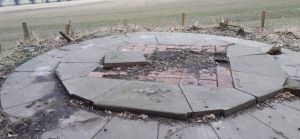Tea House on the Falkland Estate: Difference between revisions
Jump to navigation
Jump to search
No edit summary |
No edit summary |
||
| Line 4: | Line 4: | ||
The footpath surrounding [[Scroggie Park]] at one time featured a thatched "'''Tea House'''" near the corner of the cricket pitch. | The footpath surrounding [[Scroggie Park]] at one time featured a thatched "'''Tea House'''" near the corner of the cricket pitch. | ||
"1897 approx, construction of a thatched “Tea House” in the corner of Scroggie Park, surrounded by a low wall with wrought iron gates with the initials B, J and G, for the Third Marquess and his wife. It was in the Arts and Crafts style and designed by Robert Weir Schultz who did much of the work at the House of Falkland in the 1890s. This survived until the 1970s, Dave Dryburgh remembered the ceiling being embedded with sea shells. There was a walk around the north and east sides of the cricket field which linked to the [[Private Walk]] leading to the Palace orchard." | "1897 approx, construction of a thatched “Tea House” in the corner of Scroggie Park, surrounded by a low wall with wrought iron gates with the initials B, J and G, for the Third Marquess and his wife. It was in the Arts and Crafts style and designed by [[Robert Weir Schultz]] who did much of the work at the House of Falkland in the 1890s. This survived until the 1970s, Dave Dryburgh remembered the ceiling being embedded with sea shells. There was a walk around the north and east sides of the cricket field which linked to the [[Private Walk]] leading to the Palace orchard." | ||
[[Category:Demolished buildings]] | [[Category:Demolished buildings]] | ||
Latest revision as of 11:45, 7 March 2024

The footpath surrounding Scroggie Park at one time featured a thatched "Tea House" near the corner of the cricket pitch.
"1897 approx, construction of a thatched “Tea House” in the corner of Scroggie Park, surrounded by a low wall with wrought iron gates with the initials B, J and G, for the Third Marquess and his wife. It was in the Arts and Crafts style and designed by Robert Weir Schultz who did much of the work at the House of Falkland in the 1890s. This survived until the 1970s, Dave Dryburgh remembered the ceiling being embedded with sea shells. There was a walk around the north and east sides of the cricket field which linked to the Private Walk leading to the Palace orchard."